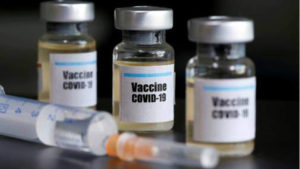 As the Moderna and Pfizer COVID-19 vaccines continue to roll out across the country, the biggest concern that many people have surrounds their potential side effects. In an effort to quell the fear currently circulating surrounding the vaccine—which experts maintain will help ensure herd immunity if the majority of people get it—the Centers for Disease Control and Prevention is now addressing the vaccine’s most common side effects. “COVID-19 vaccination will help protect you from getting COVID-19,” they write in their new guidance published Monday. “You may have some side effects, which are normal signs that your body is building protection. These side effects may affect your ability to do daily activities, but they should go away in a few days.” Read on to see what they are—and to ensure your health and the health of others, don’t miss these Sure Signs You’ve Already Had Coronavirus.
As the Moderna and Pfizer COVID-19 vaccines continue to roll out across the country, the biggest concern that many people have surrounds their potential side effects. In an effort to quell the fear currently circulating surrounding the vaccine—which experts maintain will help ensure herd immunity if the majority of people get it—the Centers for Disease Control and Prevention is now addressing the vaccine’s most common side effects. “COVID-19 vaccination will help protect you from getting COVID-19,” they write in their new guidance published Monday. “You may have some side effects, which are normal signs that your body is building protection. These side effects may affect your ability to do daily activities, but they should go away in a few days.” Read on to see what they are—and to ensure your health and the health of others, don’t miss these Sure Signs You’ve Already Had Coronavirus.
1 You Might Feel a Bit of Pain
You might experience pain around the injection site. “If you have pain or discomfort, talk to your doctor about taking an over-the-counter medicine, such as ibuprofen or acetaminophen,” they explain. They also suggest applying a clean, cool, wet washcloth over the area.
2 You Might Have Swelling
The CDC explains that you might also experience swelling on the arm where you get the shot. “Use or exercise your arm,” they encourage as a way to reduce any irritation.
3 You Might Have a Fever
Fever is a relatively common side effect of any vaccination. To reduce discomfort from fever, the CDC recommends drinking “plenty of fluids” and dressing lightly.
4 You Might Have Chills
Fever and chills go hand in hand, so it isn’t surprising that the cooling sensation is also a possible side effect.
5 You Might Feel Tiredness
If you feel a bit fatigued after your vaccine, do not stress. It is a normal side effect, according to the CDC.
6 You Might Have a Headache
Finally, a headache is another common side effect of the vaccine.
7 The Side Effects May Feel “Flu-Like” in Nature
Per the CDC, “Side effects may feel like flu and even affect your ability to do daily activities, but they should go away in a few days,” they promise.
8 Severe Allergic Reactions Are Rare
While there have been cases of severe allergic reactions as a result of the vaccine, they aren’t likely. “If you get a COVID-19 vaccine and you think you might be having a severe allergic reaction after leaving the vaccination site, seek immediate medical care by calling 911,” they encourage.
9 When to Call Your Doctor
While “discomfort from fever or pain is normal” there are a few situations in which the CDC suggests contacting your doctor or healthcare provider:
If the redness or tenderness where you got the shot increases after 24 hours
If your side effects are worrying you or do not seem to be going away after a few days
10 Don’t Forget Your Booster
“With most COVID-19 vaccines, you will need 2 shots in order for them to work,” the CDC reminds. “Get the second shot even if you have side effects after the first shot, unless a vaccination provider or your doctor tells you not to get a second shot.”
11 Protection Takes Time
Immunity won’t happen overnight, and definitely not until after your second shot. “It takes time for your body to build protection after any vaccination,” they point out. “COVID-19 vaccines that require 2 shots may not protect you until a week or two after your second shot.”
12 How to Protect Yourself
As for yourself, the CDC’s recommendation and help end this surge, no matter where you live—”cover your mouth and nose with a mask when around others, stay at least 6 feet away from others, avoid crowds, and wash your hands often,” they remind, and to protect your life and the lives of others, don’t visit any of these 35 Places You’re Most Likely to Catch COVID.
